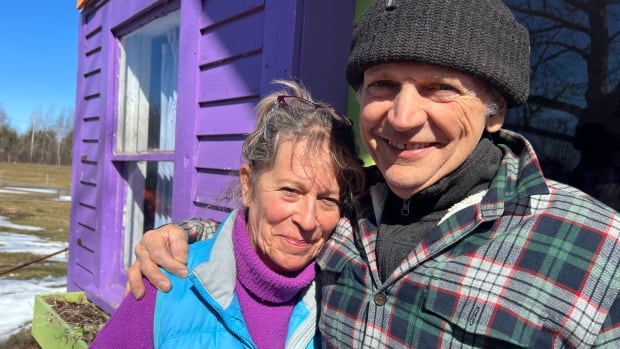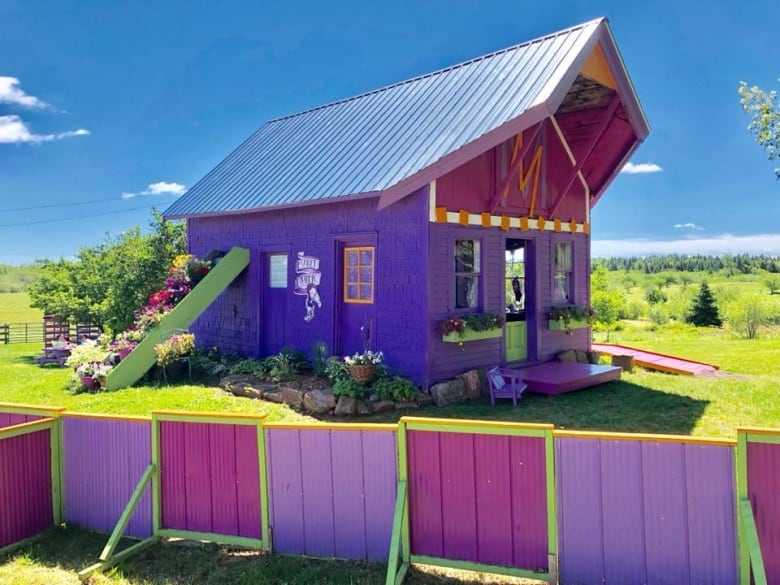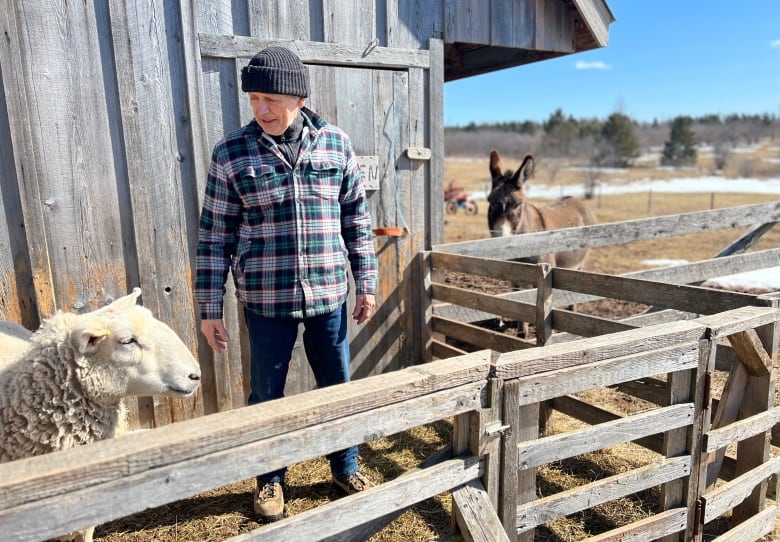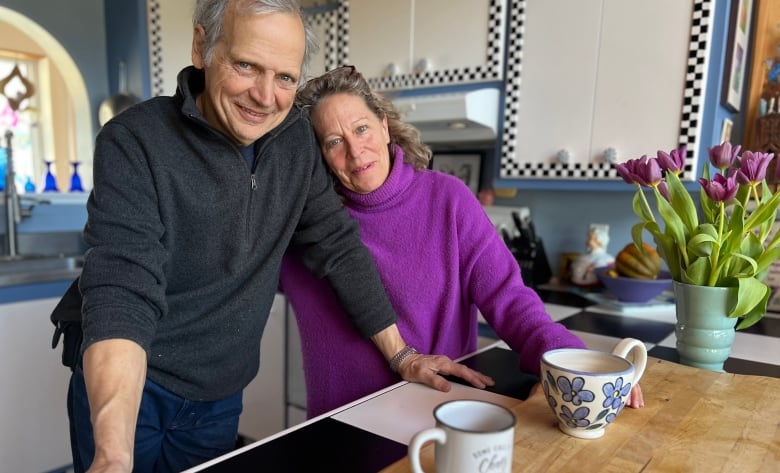
The Current23:23Facing Alzheimer’s, this couple still finds time to dance, and seize joy in the moment
When Sheree Fitch’s husband was diagnosed with early onset Alzheimer’s, she looked around for information to help them cope — but the negativity she found only increased her distress.
“[It was all] ‘Oh, this is a horrible disease, and it’s a nightmare and oh, you’re going to hate your spouse,'” said Fitch, the author best known for her children’s books Mabel Murple and Sleeping Dragons All Around.
“And I kept thinking, ‘No, no, there’s got to be a way that this can also be something you journey forth together in,'” she told The Current’s Matt Galloway.
“It’s a different kind of life, but you’ve got to find a way to hang on to this joy and this beautiful part of who we are together.”
Fitch’s husband, Gilles Plante, worked as a CBC journalist before retiring at 53 and building the couple’s dream home in River John, a small fishing village in rural Nova Scotia. His diagnosis came in early 2017, aged 60.
Doctors said to expect five more good years at most, but “we’re passed that … so I’m not complaining for sure,” Plante told Galloway.
“It’s not perfect, but not as bad as I was expecting to be.”
Laura Middleton is an associate professor in the department of kinesiology and health sciences at the University of Waterloo. She will moderate the “Finding Hope in Dementia” online panel.
According to the Alzheimer Society of Canada, 28,000 people in Canada are living with young-onset dementia. A case is considered young-onset if diagnosed before the age of 65, though it affects some people as young as in their 30s.
The couple moved to River John in 2011, and set about turning an old property into a working hobby farm — which they called the Happy Doodle Do. Plante has a woodworking shop where he makes and mends for the farm. Around the time of his diagnosis, he turned an old granary into a small book shop that opens for a few weeks in summer, decked out in the fantastical colours that mirror Fitch’s whimsical writing.
“When you have animals and a big place, there’s always something to do … [it’s a] goal for the next day and the next,” Plante said.
“I wouldn’t leave that place for [anything]. They would have to put me on the truck,” he laughed.


Fitch described the home they’ve built as a “childhood dream come true.”
“The river is below us and it’s beautiful. And across the road, we have critters, lots of them. Bunnies and sheep and donkeys and hens,” she said.
While the farm and his workshop keep Plante active, they have disagreed on just how active he should be.
“I worry about his fingers and the saws,” Fitch said, adding that Plante insists he keep up the things he loves to do.
“He’s like, ‘But Sheree, I would rather die doing what I’d like to do.’ And I’m like, ‘Yeah, but this way there’ll be a lot of blood,'” she said.
“We have to laugh about it. Because I have to learn to let go and let Gilles do what he wants to do, within limits — and Gilles has to listen to me, too.”

Fitch said the years since his diagnosis have been a learning curve, and still are, but they both decided to share their experience to break taboos, and help others facing a similar diagnosis.
“I want people to know that there is a way to endure this disease that isn’t this total dark disaster nightmare,” she said.
“There’s a joyfulness in this chapter of our life together that I can’t really put into words, but it’s real.”
Plante says he has no regrets.
“I am in a good place and even if I die tomorrow, I say, ‘OK, I have done my time, and I’ll wait for her on the other side.'”
Finding joy in the present moment
Fitch and Plante met in 1992, and married two years later. She said he’s been a “quiet force” in her life, who has taught her to live in the present moment.
That’s been key to living with Alzheimer’s.
“Nothing’s predictable. It can change each hour — sometimes every five minutes — and so [you need] that ability to kind of be in that joyful moment and let it go,” she said.
“That just is extraordinary to me — how much fun we still have, how we dance.”
There are times when she’s angry, Fitch said, and times when it’s hard not to compare their lives now to the life they once led. But there are also times when it’s clear to her that even if his memory is failing, Plante still has his wisdom —and the love they share.
In 2018, a year after Plante’s diagnosis, the couple lost a son, Dustin.
“I don’t remember much, Matt, about that year, but I can tell you that my Alzheimer’s husband took care of me more than I took care of him,” she told Galloway.
But while she does sometimes feel overwhelmed, those feelings don’t last.
“I know the man I’ve had in my life. I know what we’ve had. And so I’m grateful — more than anything else I’m grateful,” she said.

‘To love this man enough’
On the night of his diagnosis, Plante told Fitch he would one day want to access medical assistance in dying (MAID). His mother suffered with Alzheimer’s at the end of her life, and he didn’t want to face the same ordeal.
The couple were at odds about his wish for almost two years, Fitch said.
“I was mad. I said, ‘Don’t you think I love you enough to take care of you like other people do?'” she said.
“Then this one night … he said, ‘Sheree, it’s not about you. It’s about what I want.'”
In that second she realized that she “would have to find a way to love this man enough to help him do what he wanted to do, when he wanted to do it.”
The Current33:48Facing early onset Alzheimer’s, a Quebec woman fights for a good death
Under current legislation, those seeking MAID must be able to provide informed consent at the time of the procedure. In cases involving Alzheimer’s, patients fear the disease will rob them of that ability to consent — and some choose an assisted death earlier, while they can still meet requirements.
The federal government is in the process of reviewing a range of expansions to MAID legislation, including advanced consent in certain circumstances. Provinces and territories also implement their own regulations. In February, Quebec tabled a bill that would establish guidelines to allow some advance requests.
Plante isn’t planning to access MAID any time soon. He has told Fitch that when he can no longer get up, get dressed and work on the farm he loves, then that’s no longer the life he wants to lead.
“That is his decision about the ‘when,’ and so that’s the framework we have to work in,” said Fitch.
“And yeah, I’ll be piggybacking him over there to do the chores, you can be damn sure.”

To spring, and beyond
With spring around the corner, the couple are planning a year of rebuilding at the Happy Doodle Do hobby farm. Their barn was damaged in post-tropical storm Fiona last year, and Plante will be using his construction skills to repair it.
“It’s easier because you don’t have to be very fancy — a barn is a barn,” he said.
The bookshop will stay closed this summer, to give them time to catch their breath.
“I’m looking forward to planting things … coming out of the winter is the best part of the year, and summer to look forward to,” Fitch said.
The children’s author has found it hard to summon the playful verse she’s known for, but has been journalling about their experiences with Alzheimer’s, with works-in-progress she calls Moments.
The Current0:57Moments, by Sheree Fitch
In one piece, she included a line from the wedding vows they made almost 30 years ago. At the time, she didn’t want to say “‘Til death do us part,” so Plante suggested an alternative.
“He said, ‘In French we have an expression: Et au delà, and it means ‘and beyond,'” she said.
“We’re living that. We’re living in this moment that we know will also be beyond. And I think that when you can stay in that realm, you’re OK.”
